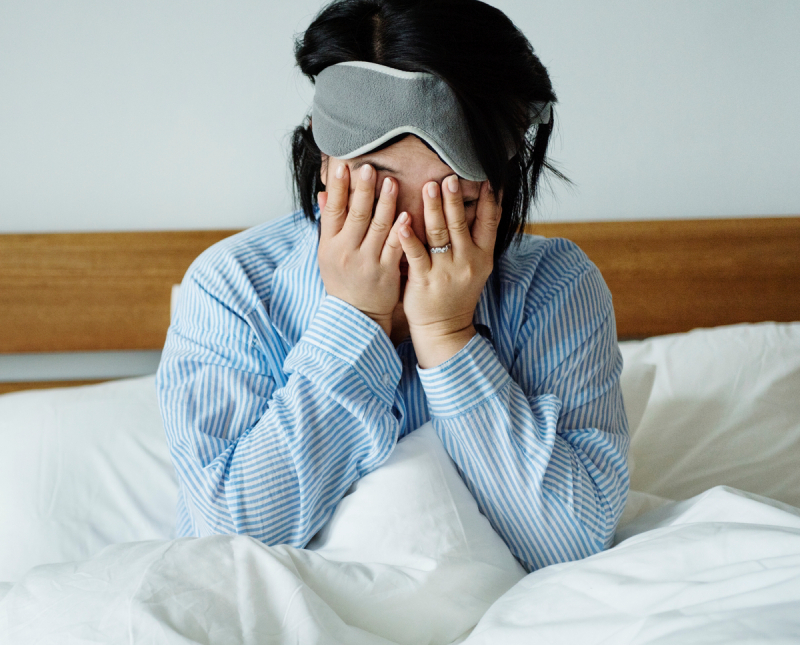Insomnia is growing in its prevalence in society. The majority of insomnia in the general population is now at 9.1%. Particularly in adolescents and young adults, it has been found that up to 20% have some form of insomnia at any one time. It has also been shown that, in the general population, 4% of women and 6% of men have symptoms and excessive daytime sleepiness, which is a predictor of severe insomnia.
The stress experienced by people when they are trying to sleep may further worsen their condition. Mental and physical stress can cause changes in the brain that could make it difficult for the person to sleep. When stress is added, it can worsen the symptoms of both.
What Is Insomnia?
Insomnia is defined by one or more nights of shorter than desired sleep, with symptoms including difficulty initiating sleep, difficulty maintaining sleep, and early morning awakening. It can be acute (lasting less than one month) or chronic (lasting more than six months). In addition to sleep disturbances, other symptoms include mood disturbances (e.g., depression), impaired daytime functioning, and fatigue, among others.
It has been found that people with insomnia have higher rates of stress which can lead to increased anxiety in some people, which is in turn compounded by the additional lack of decent restful sleep.
The Role Stress Plays in Causing Insomnia
Numerous studies have been conducted in this area, and much research is underway. Stress affects brain function which can cause people to have trouble sleeping at night. Some studies show that stress can cause people with insomnia to experience more severe symptoms than those who aren’t suffering from stress, and also suffer chronic sleep deprivation because of their stresses. Also, it indicates that stress can be a factor in the development of insomnia in the first place.
The relationship between stress and insomnia
A person who experiences high levels of stress is vulnerable to developing problems with sleeping. There are multiple ways that stress can cause a person to have problems sleeping. One of them is due to the body’s release of adrenaline and other such chemicals when a person is stressed out. These substances cause one’s blood pressure to rise and raise one’s heart rate. The heart rate increases because this stimulates the heart, making it beat faster, which in turn causes more blood to flow through one’s system, making it so hard to find sleep. Due to this condition, the body remains restless, leading to sleeplessness.

Tell-tell signs you have insomnia
- You wake up in the middle of the night, even though your sleep is not disturbed
- You find it hard to fall asleep and wake up more often than usual
- You need help maintaining sleep, even when going to bed simultaneously each night
- You get up during the night and cannot go back to sleep and would like to go back to sleep but are unable to do so for any reason
- You are sleepy during the day
- You need help concentrating, remembering things, and being less effective at your job
- You feel an increased anxiety that is not associated with anything in particular
- You feel frustrated and find it hard to cope with things that used to be manageable before you had it
- You take more time doing simple tasks than before you started having it (e.g., getting dressed)
- Your ability to have fun and enjoy yourself declines due to a lack of energy
Impact of insomnia on mind and body
Sleeplessness takes its toll on the mind and the body and can cause mental and physical health problems as follows:
- Feelings of anxiety and depression and increased levels of irritability
- Slower cognitive function
- Decreased quality of life due to inability to perform daily activities
- Weight gain or loss
- Heart problems and breathing difficulties such as sleep apnoea (a disorder that causes suffocation and snoring)
- Increased risk of being involved in motor vehicle accidents due to driving drowsiness
- Risk of increased accidents/reduction in performance at work
- Increased likelihood of negative coping mechanisms e.g., alcohol consumption because some people use this substance to fall asleep (despite the reality that alcohol consumed within the hours before bedtime may cause sleeplessness rather than help resolve it).
How to look after yourself when suffering from a bout of insomnia
Some things can be done to look after yourself when suffering from a bout of insomnia:
- Take regular naps if you find sleeping difficult at night
- Try to reduce stress as much as possible
- Seek alternative stress management methods such as relaxation techniques
- Improve sleep quality by keeping a regular bedtime and wake time. If you typically go to bed at 10 pm and wake up at midnight, then try limiting your rest by an hour each night and see if this makes a difference in your ability to fall asleep at night
- Ensure your bedroom is dark and quiet. Dimming or turning off the lights may help you fall asleep, as will removing any distractions from the room (e.g., installing an alarm clock with a built-in snooze button)
- Try not to worry about anything that might make it hard to fall asleep. Worrying will only serve to make matters worse, and it may lead to feelings of stress that can disrupt sleep even further – so try not to let anything get in between you and your ability to fall asleep at night
- Seek professional help from a Stress Management Coach
- Try alternative therapy e.g., ‘Cognitive Behavioural Therapy’ (CBT) – this technique is used to treat various problems, including insomnia. Cognitive Behavioural Therapy can help you identify your thoughts and beliefs and work on changing these thought patterns.
Can we help you?
Leave us your information and one of our coaches will contact you in 24H

Behaviours to change to minimize the chance of another period of sleeplessness
Certain behaviours increase the likelihood of developing sleeplessness again in the future, so you must try to stop these if you are a sufferer. These behaviours include:
- Caffeine during the evening can disrupt your efforts to fall asleep, so avoid it if possible
- Avoiding computers and television before bed – it might seem like a good idea to get some work done on the computer or watch a little TV before bed before going to sleep, but this can cause anxiety which may lead you to be unable to fall asleep
- Try and avoid unhealthy coping mechanisms to try to get you to sleep
Top tips to rid yourself of this troublesome sleep disorder
- Stick to your bedtime and wake time. Try limiting your sleep by an hour each night and see if this makes a difference in your ability to fall asleep at night
- Do something relaxing before going to sleep – such as reading a book or taking a warm bath
- Try not to ruminate about anything that might make it hard to fall asleep – this will only disrupt your sleep and make you unable to sleep again
- Avoid alcohol and caffeine during the evening – these substances can disrupt sleep, so try avoiding them as much as possible
Stress & burnout coaching; for 100% recovery!
Reducing stress and recovering from burnout is simply incredibly difficult. The coaches at Meulenberg Training & Coaching understand exactly what you are going through and know how tough it can be. They have often experienced it themselves! With their years of experience and expertise, they are ready to help you step by step toward a full recovery. The results of our one-on-one coaching and absenteeism training will benefit you for a lifetime!
FAQ’s
References
- Mayoclinic.org – Insomnia – found on 28/12/2022
Link to page on mayoclinic.org - Sleepfoundation.org – Stress and Insomnia – found on 28/12/2022
Link to page on sleepfoundation.org - NCBI.gov – CHRONIC INSOMNIA AND STRESS SYSTEM – found on 28/12/2022
Link to page on ncbi.gov






